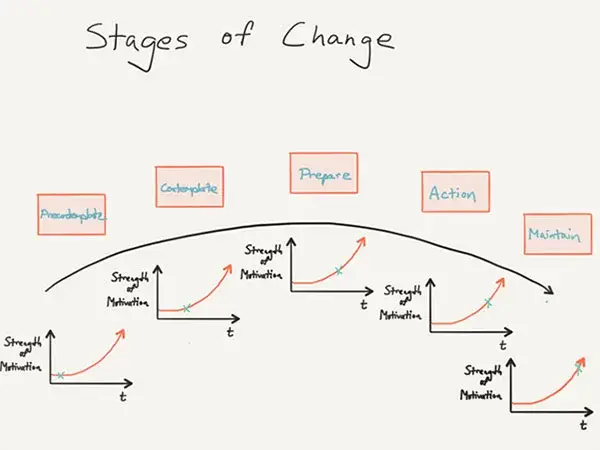Click here to listen to the audio version
ADDICTION SCIENCE
We pay so much attention to stages of change in the course of treatment at CeDAR. If we can help someone hold good acceptance and commitment to their recovery, they often succeed. When people tend to sabotage treatment, reject options for themselves, or show a poor follow-through, it usually is connected to poor overall motivation.
This article approaches the stage of change for a reader working through this process. If you are a family member of someone working to recover, imagine what that person may list as motivating factors around a process of change. Also imagine change processes for issues other than substance abuse, such as weight loss, lifestyle choices, or relationship choices. Stage-of-change strategies are often used across multiple areas of healthcare.
Rating Need, Readiness and Confidence
It can be worthwhile reviewing stages of change for yourself and trying to identify where you fall. Most people will progress gradually through stages of change, mainly because they have to! Continued substance use is just too overwhelming for the human body and destructive to overall lifestyle. The natural progression is for it to become unmanageable. By looking at some of the following topics in motivation, you can promote change for yourself sooner than a ‘rock bottom’ scenario.
Ultimately, if you want to really recover, you need consistent and honest motivation. Let’s use some scales to quantify your motivation and break it into parts.
How would you rate yourself on a scale of 1 to 10 (1 for “least or weak” and 10 for “most or strong”) for the following questions?
- Your NEED today to be clean from substances? 1-10
- Your READINESS today to be clean from your substance? 1-10
- Your CONFIDENCE that you could stay clean today from substances? 1-10
Try to be honest with yourself about these questions. One of the reasons we review this topic in greater depth is to promote legitimate honesty and acknowledge that deep change can be harder than people think. It is common to feel committed and motivated to get clean from opioids or alcohol at the beginning and then to get frustrated or discouraged after about a month.
Addiction is an ambivalent disease. We expect opposing forces in your mind (I want to stop using/I don’t want to stop using) because that’s part of the disease. Through acknowledging the ambivalence, you become more powerful. You’re telling yourself the truth.
Now, let’s break down each of these 3 motivational zones – Need, Readiness, and Confidence.
Need
To really understand your need for recovery, we will have to look at areas in your life which have high stakes. Examples of things to promote your need for recovery could include:
- Upcoming or current legal reasons to stop substance use
- Medical consequences of your addiction such as an overdose or an infection
- Severe financial consequences of your addiction
Think about areas of need that apply to you. Many people have reached a solid recovery through the mindset of:
“I’d love to use heroin or drink, but I just CAN’T…I know where it leads”
Readiness
Timing is everything. Many things need to align with your life to recover. The all-too-common statement of “Now just isn’t the right time!” often makes sense and no one can fault you for being hesitant to change. Change is also filled with anxiety, setbacks, and frustration. Do you feel at a point in your life that you could cope adequately with such stress? Could you keep up the good fight to change and avoid your substance?
The benefits of your recovery are so remarkable that you won’t regret it!
Confidence
Rating confidence is tricky. There seems to be a sweet-spot for confidence in that you feel prepared and driven, while not arrogant or careless. A score at 7 or 8 is often the goal. If you place yourself at 10 out of 10, you may be over-estimating your strength in recovery.
If you score a 2 or 3, what are things you feel you might be missing? Does it feel that your support network won’t actually support you being off drugs or alcohol? Do you feel that anxiety or depression might derail your recovery? Are you worried that chronic pain issues may push you back onto opioid painkillers?
It can be useful to write down things you think you need to build up in order to feel more confident and stronger in your recovery. Our goal at CeDAR is to help your confidence number go up while still respecting addiction as a chronic disease.
Progression
We often talk in treatment about the disease of alcoholism or drug addiction progressing to worse states over time. Someone becomes more impaired, more out of control, and more depressed.
It is very common for a stage of change to progress in a positive fashion over time. Through treatment, we help people examine where they exist on a change continuum. Being mindful of this can be useful in explaining how treatment feels as a whole. It is very often the highly motivated people will conceptualize a treatment experience as challenging and positive, while the precontemplative people will describe the treatment as boring.
Motivation for change is so incredibly important in addiction treatment. Its presence often predicts a strong outcome. Its absence often predicts treatment resistance and dropout.

